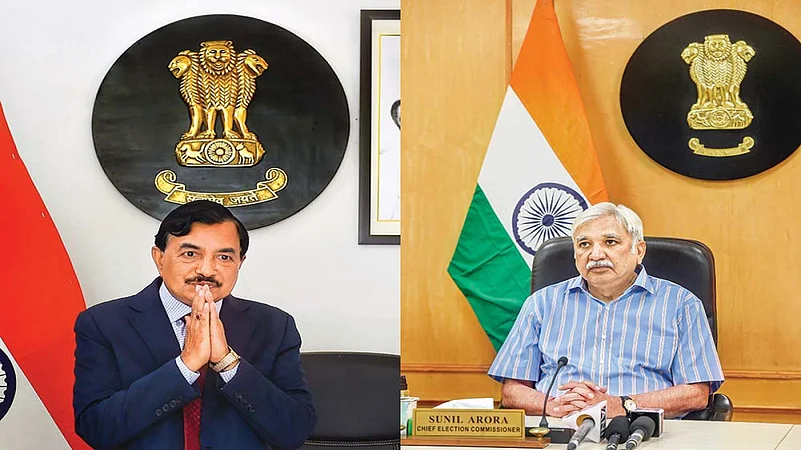Conspiracy theories about hacked EVMs are old hat. From baffling poll schedules and inequitable application of the model code of conduct to brazenly partisan policy prescriptions, the litany of accusations hurled by various- -stakeholders—barring the BJP and its allies—at the Election Commission (EC) gets more expansive with every election. The ongoing assembly polls have been no different, and this time the blame has been pinned on Sunil Arora, who was chief election -commissioner (CEC) until April 12 and oversaw elections in Tamil Nadu, Kerala, Assam and Pondicherry as well as four of the eight phases of polling in West Bengal. Arora’s successor, Sushil Chandra, under whose watch poll results will be announced on May 2 and crucial elections held in Uttar Pradesh, Punjab, Uttarakhand, Goa and Manipur next year, is certain to face similar accusations.
Omission And Commission
The central poll panel’s legacy as a guarantor of democratic tenets in the conduct of elections is taking hit after damaging hit

Arora’s tenure would likely serve as a ready reckoner for Chandra when he steers the EC over the next 13 months. The EC has a robust institutional memory shaped as much by the likes of Sukumar Sen (India’s first CEC), T.N. Seshan and J.M. Lyngdoh, as it is by its more recent chiefs such as Navin Chawla, A.K. Joti and O.P. Rawat. The legacy Arora leaves behind is similarly part of the institutional memory of the body mandated with ensuring free and fair elections. Opposition politicians and commentators have been unanimous that he followed contentious precedents set by his immediate predecessors—Rawat and Joti, both routinely accused of subservience to the executive—while conspicuously ignoring precedents set by Seshan, Lyngdoh or S.Y. Quraishi. In the process, Arora established some precedents of his own, and the brickbats against these have been swift and scathing.
“The ‘engine that drives India’s -elections’ seems to have corroded fast,” says retired IAS officer M.G. Devasahayam in Are Elections in India Free and Fair?, a recent report of the Citizens’ Commission on Elections (CCE). “It is maintaining the fig leaf of ‘free and fair elections’ only by -deploying a vast array of paramilitary forces, a variety of observers and flying squads, while losing its essence of level playing field, democracy -principles and public faith…. No wonder then that India is being branded as an electoral autocracy.” Devashayam’s comment was made partly in reference to the 2019 Lok Sabha polls conducted -during Arora’s tenure as CEC. Former Supreme Court judge Justice Madan B. Lokur and former chief -information commissioner Wajahat Habibullah are the chair and vice chair, respectively, of the CCE, which has brought out two extensive reports on India’s electoral system and the EC’s functioning in -recent years.
“There is no doubt that the EC’s -behaviour is less than fair and favours the ruling party at the Centre, but this tendency is not unique to this -institution,” says Prof Jagdeep Chhokar, co-founder of the Association for Democratic Reforms (ADR). “The apparent subservience of some CECs to the Centre has now -saddled the poll body with an added burden. Partisanship has crept into its policy formulations and the damage this will do to the electoral system is far graver than issues like using -different yardsticks for penalising model code violations or appointment of poll observers.”
The past few years have seen the EC endorsing controversial policies and even making a swift volte face on the Centre’s contentious electoral bond scheme, allegedly to serve the ruling BJP’s political ends. Last November, the EC wrote to the law ministry claiming it is prepared to implement the electronically transmitted postal ballot system (ETBPS) for non-resident Indians. NRIs would -receive electronically transmitted postal ballots, which they could fill out and return, by post, to the Indian poll authorities. According to the EC’s November communiqué, the pilot ETBPS excludes an approximate 10 million NRIs residing in six Gulf countries—a large chunk of them Muslims.
Arora’s tenure saw the EC regularly letting the BJP off the hook for model code violations, while it penalised -politicians from other parties in -similar cases. This was most evident during the Lok Sabha polls when every complaint against Narendra Modi and Amit Shah over the model code was summarily dismissed, while their -political rivals were routinely reprimanded. Some BJP leaders were -penalised, but the alleged violations by Modi and Shah stood out, particularly when then election commissioner Ashok Lavasa dissented with the reprieve given to the duo. Arora refused to note Lavasa’s dissent in the minutes and Lavasa was subsequently eased out of the EC after Modi -returned to power with a greater -mandate. This trend has continued in the ongoing assembly polls. The EC banned the BJP’s Himanta Biswa Sarma in Assam from campaigning for 48 hours for threatening a political rival, and then relaxed this by 24 hours without hearing the complainants.
The EC’s decisions on poll schedules too have drawn much criticism in -recent years. Arora seemed to be -following a precedent set by Joti, who had faced much flak in 2017 for holding back announcement of poll schedule for the Gujarat assembly while -announcing it for Himachal Pradesh, though counting of votes for both states was to be done on the same date. The two-week delay in announcement of the Gujarat schedule allowed the ruling BJP to announce several sops as the model code had not come into -effect. Joti’s previous connection with Modi—he was Gujarat’s chief secretary when Modi was CM—was immediately called out as reason of his partisan conduct. The same modus operandi of selectively holding back -announcement of poll schedules, while the BJP went on a sop-declaring spree, was later adopted with slight -modifications by Joti’s successor, Rawat, and then by Arora.
On Arora’s watch, the EC also made another significant change in its election conduct rules this season by relaxing norms for appointment of polling booth agents of parties without proper consultation with all stakeholders. It later transpired, through a leaked tape, that the change was exactly what the BJP’s Bengal leaders wanted. This, of course, may seem like a minor slip compared to other controversies -related to the ongoing polls—for -instance, poll officials used the -personal vehicle of a BJP candidate in Assam to ferry an EVM that had been used earlier in the day for polling, and paramilitary forces deployed on poll duty enjoyed homely hospitality from a local BJP leader in Bengal.
Advertisement
“Under normal circumstances, these would have been considered serious offences,” says Devasahayam. “Many people have previously talked about EVMs being hacked and these were often dismissed as conspiracy theories pushed by bad losers. Now, you have visual evidence of EVMs being -hijacked by politicians, who invariably belong to the same party. The EC can’t escape its responsibility simply by -suspending poll officials or ordering a repoll. Such incidents, recurring as they have been over the past couple of years, strike at the very foundation of the principle of free and fair elections.”
Speculation is now rife about a possible post-retirement sinecure reserved for Arora—a gubernatorial posting to Goa, as some reports suggest. Should he receive such an assignment, the -cacophony over an alleged quid pro quo with the government will be deafening. However, like all other political controversies, such hubbub would be soon forgotten. As for the damage such a chequered legacy of India’s top -election official will cause to the tenets of our electoral democracy, it will keep unravelling for a long time. Incumbent CEC Sushil Chandra may wish to draw some lessons from here.
Advertisement
-
Previous Story
 Global Vaccine Research Collaborative Could Pave The Way For Faster Pandemic Response
Global Vaccine Research Collaborative Could Pave The Way For Faster Pandemic Response - Next Story


















